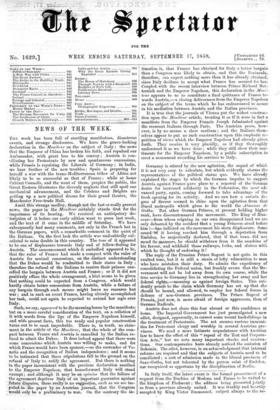Germany is stirred by the new agitation, the sequel of
which it is not very easy to calculate, but which evidently alarms the representatives of the political status quo. We have already explained the stages by which the German impulse to support Austria against France gave place to a renewal of the German desire for increased solidarity in the Federation, the most ad- vanced party, again, coming forward to take advantage of the fresh opening for its activity. And we saw how a certain de- gree of .fivour seemed to shine upon the agitation from that Ducal metropolis which gives to the world the Almanac de Gotha. But other German Princes, at present holding higher rank, have discountenanced the movement. The King of Han- over—from whose reigning in our own disappointed land we are only debarred. by the accident that a young Princess stood before
him inflicted on the movement his stern displeasure. Some sound" it having reached him through a deputation from Embden, he majestically declared, that if that town did not mend its ,manners, he should withdraw from it the sunshine of his favour, and withhold those railways, lacks, and sluices with which he thought of endowing it !
The reply of the Prussian Prince Regent is not quite in this exalted tone, but it is still a strain of lofty admonition to men who have mistaken their duty. He admits the expediency of consolidating the Federal union, but frankly avows that the Go- vernment will not be led away from its own course, while the true service to Germany lies in strengthening her army and her federal rights,—meaning as against foreign States. This evi- dently points to the claim which Germany has set up that she should be bound, and allowed, to employ her federal forces in defence of non-German provinces. The Prince Regent of Prussia, just now, is more afraid of foreign aggressors, than of German Radicals.
Austria does not share this fear abroad or this confidence at home. The Imperial Government has just promulgated a new edict, designed, apparently, to correct some recent backslidings in the treatment of Protestants. The act secures various immuni- ties for Protestant clergy and worship in several Austrian pro- vinces. We need a more intimate acquaintance with Austrian law to know the effect of this " repeal of the Test and Corpora- tion Acts," but we note many important checks and reserva- tions. Our contemporaries have already noticed the omission of Bohemia. The edict, however, is an acknowledgment that internal reforms are required and that the subjects of Austria need to be
conciliated ; a sort of admission made in the liberal precincts of Saxe-Gotha, but not tolerated by the patron saint of Embden, nor recognized as opportuhe by the disciplinarian of Berlin.


























